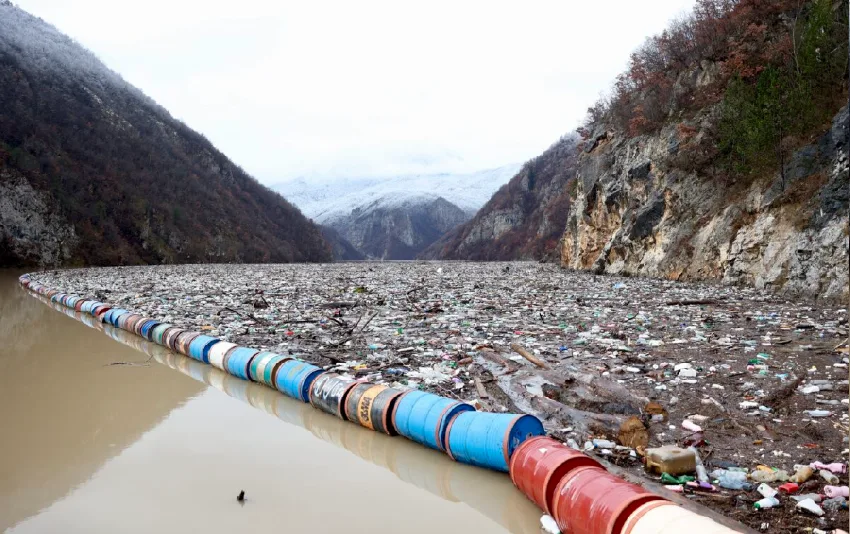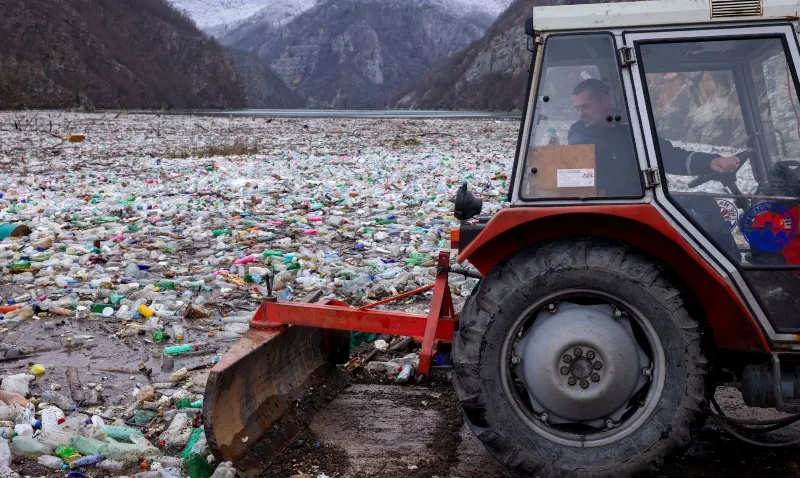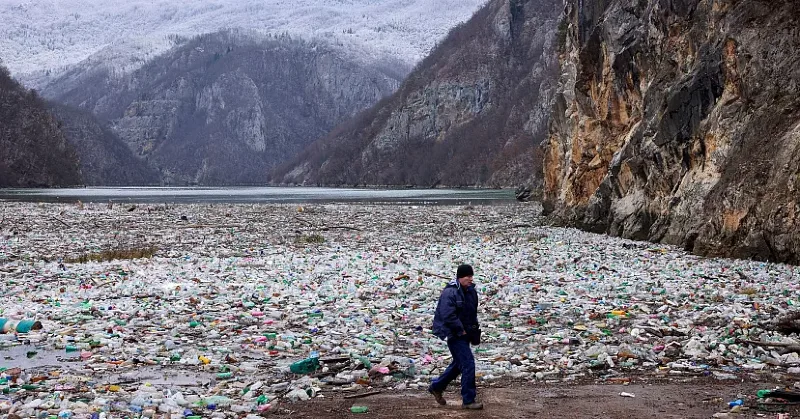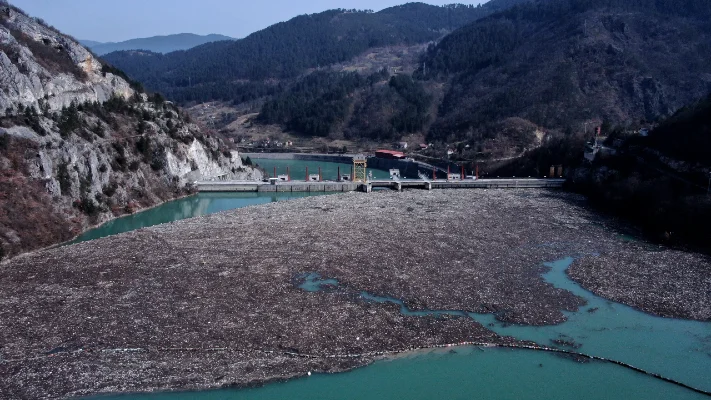Each year, as if on a twisted schedule, Bosnia’s Drina River swells with more than just water. It becomes a floating landfill, a river choked with garbage, ranging from plastic bottles to household appliances, carried by its currents. This environmental catastrophe unfolds predictably, especially during winter and early spring, when the waterways, engorged by rainfall, become powerful enough to tug the waste from numerous illegal landfills along its banks. This not only spoils the river’s natural beauty, but also starkly highlights the failure of regional authorities to uphold environmental standards.
Dejan Furtula from Eko Centar Visegrad captures this dilemma succinctly: “New year, new problems, or rather old problems with new garbage floating our way.”
Visegrad’s Vexing Visitor: The Floating Trash Barrier
Just a few kilometers upstream from Visegrad, a barrier installed by a local hydroelectric plant unwittingly becomes the last stand against this invading armada of refuse. Twice a year, this barrier transforms into a grotesque display of humanity’s neglect – a massive accumulation of debris that’s as diverse as it is disturbing. Last year’s cleanup efforts were a marathon task, stretching over 11 months, according to Furtula.

The Ripple Effect: Deterred Tourists and Health Hazards
This floating disaster is more than just an eyesore; it’s a deterrent to tourism, a pillar of Visegrad’s economy. The town, nestled along the Drina River, is renowned for its emerald waters and breathtaking scenery, making it a haven for outdoor enthusiasts and river rafters. However, the recurring emergence of this trash spectacle complicates efforts to market Visegrád as a prime tourist spot.
Olivera Todorovic from the Visegrad Tourism Board laments, “The ghastly sight that greets Visegrad visitors at the entrance to the town is a problem that we cannot solve.” The impact on tourism is palpable, as potential visitors are often repelled by the unsightly and malodorous spectacle.
But the impact extends beyond aesthetics and tourism; it poses a significant health risk. An estimated 10,000 cubic meters of waste is extracted annually from this part of the Drina near Visegrad. This waste, when burned at the municipal landfill, releases toxic smoke and leachate, posing grave health risks.
Eko Centar Visegrad plans to commence water sampling and pollutant testing in the Drina River, particularly near the landfill. Furtula’s expectations are grim: “Through air, soil and water, all the released toxins [from the landfill] return to the Drina River and I expect its pollution levels to be really, really high.”

Environmental Efforts in the Balkans: Lagging Behind
The Western Balkans, still grappling with the aftermath of the 1990s wars, trails behind the rest of Europe in economic development and environmental protection. The issues aren’t confined to river pollution; the region is plagued by severe air pollution in numerous cities. Despite aspirations to join the European Union and adopt some of its environmental regulations, progress in establishing effective waste disposal systems is slow.
Furtula and Todorovic both recognize the complexity of the issue. While quick fixes are elusive, Todorovic emphasizes the necessity of working towards a solution. Furtula suggests immediate, practical measures, like installing trash barriers upstream and forming dedicated waste collection teams to prevent further accumulation and sinking of garbage in the river.
Tracing the Origins of Bosnia's Seasonal River Crisis: A Brief History
The seasonal trash crisis plaguing Bosnia’s Drina River isn’t a recent phenomenon. It’s a problem that has gradually escalated over decades, rooted in a combination of industrial development, urbanization, and inadequate waste management infrastructure.
When the River Became a Rubbish Dump: The Start of the Crisis
The first significant instances of trash accumulation in the Drina were noticed in the late 20th century, coinciding with rapid urban expansion in the region. Since then, the problem has grown both in scale and severity, reflecting the broader challenges faced by the Western Balkans in terms of environmental protection and sustainable development.
This annual spectacle of pollution has been an unwelcome reality for the residents of Visegrad and surrounding areas for over two decades. Year after year, the river transforms into a floating landfill, with the situation worsening each time. The repeated cycle of accumulation and cleanup has become a frustrating norm for the locals, with no long-term solution in sight.
Counting the Cost: The Financial Burden of Cleanup
Cleaning up this mess every year isn’t a cheap undertaking. Each year, at least hundreds of thousands of euros are poured into cleanup operations. How much exactly, no one will state on the record. What we do know for certain is that these clean-up operations involve not only the removal of the waste but also its transportation and processing, often through burning at local landfills, which in turn poses further environmental and health risks. Despite these efforts and expenses, the problem persists, primarily due to the continuous influx of new waste.

A Stagnant Response: Why the Inaction
The question most of us have now is why has this issue not been addressed effectively?
The answer lies in a complex web of regional politics, economic constraints, and infrastructural deficiencies. The Western Balkans, still recovering from the socio-political upheavals of the 1990s, face significant challenges in aligning their environmental policies with European standards. The lack of coordinated regional strategies for waste management, inadequate enforcement of environmental laws, and limited public awareness contribute to the ongoing crisis.
More To Discover
Moreover, the cross-border nature of the Drina River, flowing through Bosnia, Serbia, and Montenegro, adds layers of diplomatic and jurisdictional complexity to any potential solution. Essentially, while Bosnia bears the brunt of the seasonal trash crisis, the source is shared by two other sovereign nations, making it difficult for one country to take long-term preventative steps.
As the Drina River continues to bear the brunt of unchecked pollution, the urgency for a sustainable solution becomes more critical. Without concerted efforts from regional governments, international bodies, and local communities, the Drina’s plight may worsen, with far-reaching consequences for the environment, public health, and the economy. The history of this seasonal trash river is not just a tale of environmental neglect; it’s a stark reminder of the interconnectedness of human actions and natural ecosystems, and the pressing need for responsible stewardship of our planet’s resources.



















